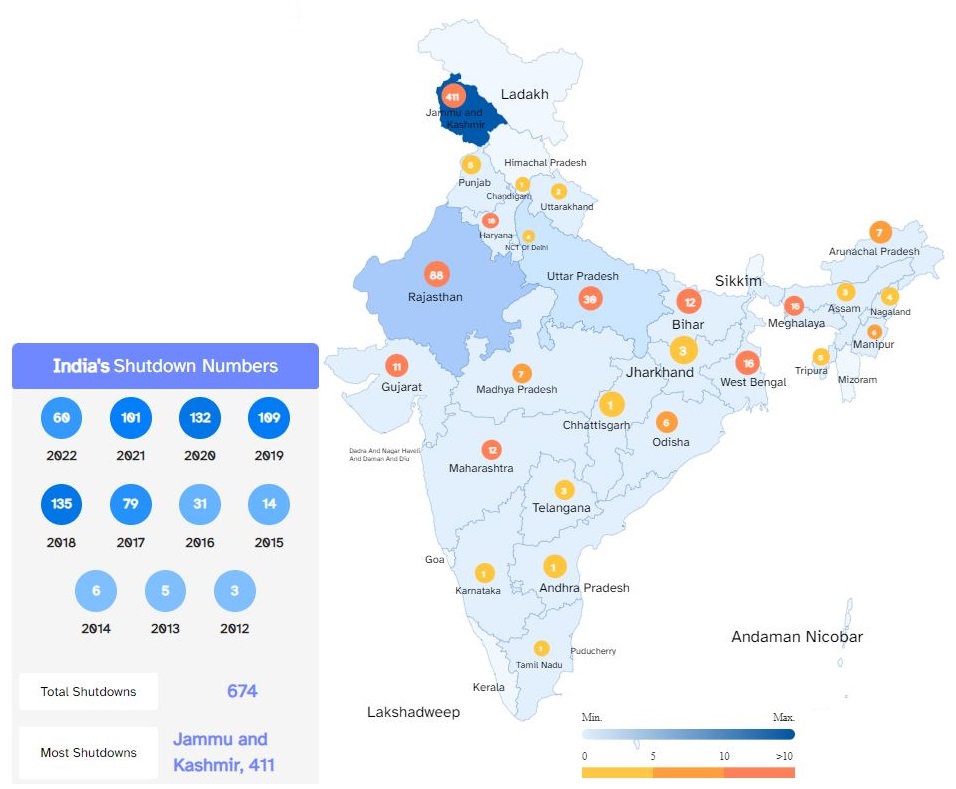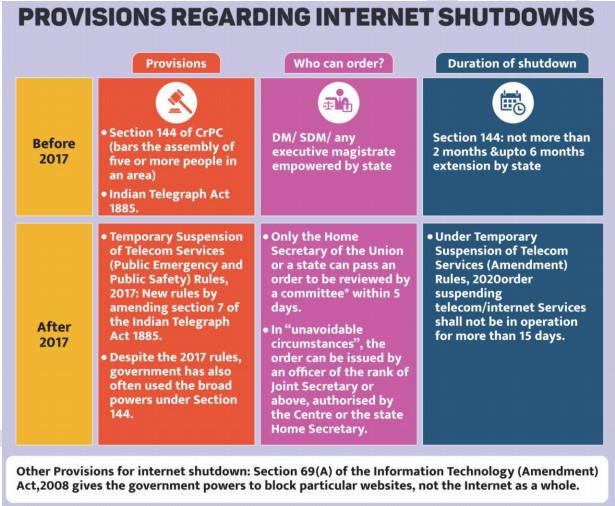Internet Shutdown & Right to Internet
2022 JUL 7
Mains >
Governance > Aspects of Good Governance > Fundamental rights
IN NEWS:
- Following the brutal on-camera killing of a tailor in Udaipur by two men, the Rajasthan government imposed a ban on Internet services. Shutting down the Internet as an administrative or law-and-order measure has been a common step taken across India — for a range of reasons and by almost all political parties and governments.
STATISTICS:

- According to the Software Freedom Law Center (SFLC), a legal services organisation working in this field in India:
- India is the leading country (by number) for Internet disruption incidents and frequency of shutdowns.
- Since 2012 there have been 665 Internet shutdowns in India to date. Here, ‘shut downs’ mean a total ban on mobile (3G, 4G/LTE), or fixed-line (dial-up, wired/wireless broadband) Internet, both or either of which may be shut down.
- This year, 59 shutdowns have been enforced.
ARGUMENT IN FAVOR OF INTERNET SHUTDOWNS
- Ensure peace and public stability:
- Misinformation and rumours can lead to deterioration in law and order in an area. So, curbing the flow of information helps maintain peace among communities in times of crisis.
- Prevent misinformation:
- Official rationales for shutdowns include combating fake news, hate speech, and related violence, securing public safety and precautionary measures such as preventing cheating during exams etc.
- Eg: Rajasthan shut down internet during the protests by the Gujjar community for reservation.
- Avoid disruptive role:
- In certain extreme situations where rumours through WhatsApp and other social media start playing a disruptive role, it may become necessary to have internet shutdowns.
- Eg: Incidents like the exodus of North East Indians from Bangalore in 2012 can be avoided with the help of shutdowns.
- National Interest:
- The internet cannot be independent of national sovereignty. Therefore, the necessary regulation of the internet is a reasonable choice of sovereign countries based on national interests.
LAWS RELATED WITH SUSPENSION OF INTERNET SERVICES:

- Telegraph Act, 1885 and the allied rule:
- The 1885 Act empowers the central government to regulate various types of telecom services including internet services and grant licenses for them.
- In 2017, the central government notified the Temporary Suspension of Telecom Services (Public Emergency or Public Service) Rules under the Telegraph Act to govern suspension of Internet.
- These rules derive their powers from Section 5(2) of the Indian Telegraph Act, which talks about interception of messages in the “interests of the sovereignty and integrity of India”.
- The Rules provide for temporary shutdown of telecom services in a region on grounds of public emergency (up to 15 days at once).
- The rule give senior bureaucrats from the Home Ministry at the central and state levels the power to order shutdowns.
- Criminal Procedure Code (CrPC), 1973:
- Before 2017, Internet suspension orders were issued under section 144 of the CrPC, which gives District Magistrates broad powers during dangerous situations.
- Despite the 2017 rules, the government has often used the broad powers under Section 144.
- Information Technology Act, 2000
- The IT Act has provided limited power to the government to issue individual web content blocking orders, instead of a larger suspension of interest itself.
CONCERNS OVER SHUTDOWNS:
- Hinders free speech:
- The Supreme Court in Shreya Singhal case has recognised internet as an essential medium to further our constitutional right to freedom of speech and expression. Hence, internet shutdowns go against ideals of Article 19.
- Increasing frequency of shutdowns:
- India shuts down Internet services more than any other democracy in the world. SFLC records shows that there has been a total of 550 internet shutdowns in India since 2012, and over 50 per cent of these shutdowns were imposed since 2019.
- Jammu and Kashmir has had more than 411 shutdowns since 2012, and the longest one went on for more than 552 days after the abrogation of the special status of the erstwhile state.
- Frivolous grounds:
- Internet shutdowns are being implemented for routine policing, and administrative purposes such as preventing cheating in exams and preventing local crime.
- Eg: The Rajasthan government imposed a shutdown to stop cheating in the Rajasthan Eligibility Examination for Teachers (REET) exam
- Vague provisions:
- Under the 2017 Rules, telecom/internet shutdowns may be ordered on grounds of public emergency and public safety. But Public emergency and public safety have not been defined in the 1885 Act or the 2017 Rules. Also, Internet shutdowns are not always officially announced.
- Based on subjective assessment:
- The Standing Committee on Communications and Information Technology in its report ‘Suspension of Telecom Services/Internet and its Impact’ noted that no parameters have been laid down to decide the merit of internet shutdowns and shutdowns have been ordered based on subjective assessment.
- Economic losses:
- According to SFLC, there is a collective loss of 16,000 hours to Internet shutdowns in India. This has led to a loss of USD 3 billion to the Indian economy.
- Gig economy and white-collar employment sectors such as IT, financial and consulting services rely on internet and shutdowns will freeze their economic activity.
- Affect free press:
- Journalists may find it impossible to do ground-reporting from already volatile areas.
- Eg: In a petition in the Supreme Court, Anuradha Bhasin, a Kashmiri journalist, stated that she said had put a halt to the work of printing newspapers due to the prolonged internet lockdown.
- Affects vital services:
- Ban on internet can affect the delivery of essential services like health services, while students may lose access to avenues of learning.
- Criticism from rights groups:
- UN rights groups >> "shutdowns are a form of collective punishment for people, and an overreach of governments on citizens’ rights and liberties".
COURTS ON INTERNET RIGHTS:
- In the Faheema Shirin versus State of Kerala case, the High Court recognised the right to internet as a fundamental freedom. It quoted the UN resolution and said that right to internet access is a tool to ensure right to education. Subsequently, internet connection has been made a basic right in the state.
- Later, the Supreme Court had declared in January 2020 that the right to access the Internet is one of our fundamental rights, alongside the freedom to carry on any trade, business or occupation over the medium of Internet, under Article 19.
- The Supreme Court also stated that there cannot be an indefinite shutdown.
- Further, the court recognized that the ‘Temporary Suspension of Telecom Services (Public Emergency or Public Service) Rules 2017’ are the only procedure to be followed to suspend Internet services in the occurrence of a “public emergency” or for it to be “in the interest of public safety”.
WAY FORWARD
- Make access to internet a fundamental right:
- States and countries have already declared internet access a fundamental right. In 2016, the United Nations declared internet access a human right.
- Implement standing committee recommendations:
- Review the Rules to address all aspects of internet shutdown and bring them in tune with changing technology to ensure minimum disturbance to the public.
- Issue uniform guidelines for states/UTs, required to be followed while ordering an internet shutdown.
- Codify defined parameters that constitute as public emergency and public safety and put in place a mechanism to decide the merit of an internet shutdown.
- DoT to formulate a policy to selectively restrict the use of certain services instead of banning the internet as a whole
- Conduct a study on the impacts of internet shutdowns and its effectiveness in dealing with public safety and public emergency.
- Data dissemination:
- Government should document the reasons, time, alternatives considered, decision-making authorities and the rules under which the shutdowns were imposed and release the documents for public scrutiny.
- Identify best practices around the world:
- Governments should identify best practices in addressing issues at their source, prioritizing alternative measures to Internet shutdowns.
PRACTICE QUESTION:
Q. ‘Democratic governments must find a way other than internet shutdowns to balance civil liberties and security’. Comment?

